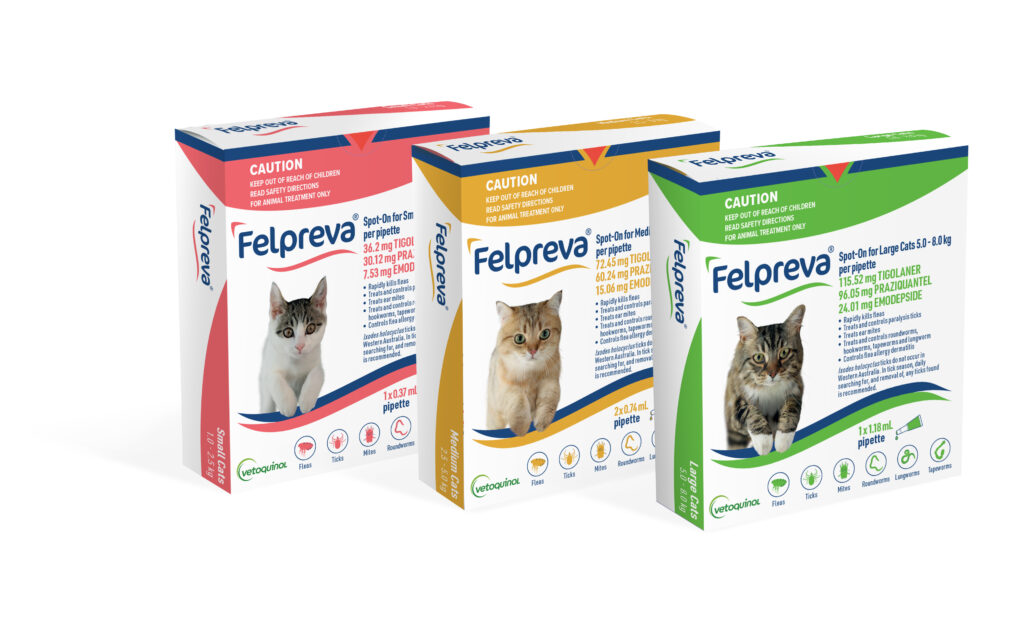Parasites and cats
Parasites can be invisible to the human eye – but they present a real threat to your cat’s health and wellbeing. Australian vets report that up to 25% percent of cats they see have no protection against parasites.*
* Vetoquinol Survey, Sapio Market Research August 2021, data on file

If your cat is affected by parasites, it can be serious causing:
Discomfort from itching to sores and gut issues relating to worms
Illness caused by paralysis ticks can be life-threatening, and other parasites can transmit diseases and infection to your cat as well
Allergic reaction to flea bites can be very serious in some cats, causing intense and distressing itching
Humans can contract parasites as well and can be affected by their bites, such as flea and tick bites. If your cat gets an parasite infection, it could be passed on to you or your loved ones.
Learn about some of the most common parasites that Felpreva® treats and why regular parasite protection is so important.
Fleas are wingless, brown, oval shaped parasites between 2-8 millimetres long. They feed off the blood of humans and animals, including cats.
When fleas bite, their saliva causes an allergic reaction in the skin, which makes the bite area itchy and swollen. While fleas can infest a home or animal in large groups, even a single flea can bite a human or animal many times, which can be extremely itchy and impact the ability to relax, concentrate and sleep.
Because fleas are larger than some other parasites, they are visible to the human eye. You might notice small, dark brown bugs in your cat’s fur, or on clothing or bedding in your home.
If your cat is scratching themselves or biting themselves to relieve itching, check for fleas by gently parting your cat’s fur in places such as the rump and ears. You might notice flea faeces in their fur, which look like tiny black specks. If you place a speck of flea faeces on a tissue, you will see a ring of blood appear around the speck.
Treating fleas takes persistence. Wash all your cat’s bedding and any affected furniture or clothing thoroughly. Vacuum and, if necessary, use a home treatment such as a flea bomb.
Flea infestations do not go away on their own, so it’s important to speak to your vet about the right care, including a preventative treatment like Felpreva®, to prevent future problems.
Worms, including hookworms and lungworms, are tiny parasites that live inside your cat’s intestines and can cause serious health issues and infections.
Normal cat behaviour such as grooming, scavenging and exploring can unfortunately put your cat at risk of contracting worms, and kittens are at an even higher risk of contracting them. Worms can also sometimes transfer from cats to humans, posing a threat to you and your loved ones.
A cat with worms may have an itchy bottom, causing them to scoot across the floor or drag against things in order to relieve the itching. Other symptoms of a worm infection can include weight loss, loss of appetite, weakness, diahorroea and vomiting. If left untreated, worms can sometimes sadly be fatal in cats.
The only way to treat worms is through worming treatments – but these only kill existing infections. In order to protect your cat against worms long term, regular preventative treatments, like Felpreva®, are very important.
Ticks are parasites that feed on blood. They are around the size of an apple seed and are dark brown in colour. Paralysis ticks, which can cause very serious symptoms in cats, sometimes have a grey body but can also be darker in colour.
Ticks attach to humans and animals rather than flying or hopping. They can inject toxins which cause serious issues such as allergic reactions or tick paralysis.
It’s important to regularly check your cat’s fur for ticks, especially if they are a longhair breed. Ticks are visible to the human eye so you may be able to spot them in the fur if you take a good look – remember to check spots such as the toes, around the mouth and behind the ears.
If your cat has tick paralysis, it will seem very tired and wobbly on its feet. Other symptoms include drooling, vomiting, ragged breath or a change in their regular sounds or meows. In serious cases, your cat might even collapse. It is very important to seek veterinary treatment if you think your cat has been bitten by a paralysis tick.
Prevention, such as with a treatment like Felpreva®, is always better than cure but, if you find your cat has contracted ticks, speak to your vet about the right topical treatment to remove the ticks and their eggs.
Always keep your home and garden well-maintained and conduct regular checks of your cat’s fur to be safe.
Felpreva®'s convenient treatment comprehensively covers your cat against all the main parasites in an easy to use
spot-on.





